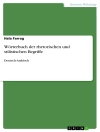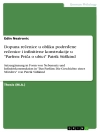Peter Berger untersucht anhand der Subjekt-Semantik, wie unsicher gewordene Semantiken auf literarische Texte gewirkt haben. Die im Laufe des 19. Jahrhunderts problematisch gewordene Semantik des ›starken Subjekts‹ als einem konsistenten, sprach- und handlungsmächtigen Ich, das im Drama lange ein Residuum gefunden hat, wurde ab circa 1890 in einer Reihe von Dramen auf seine Konsequenzen für die Gattung hin befragt. Es zeigt sich, dass diese semantische Verunsicherung neben der Theatermoderne zur großen Vielfalt dramatischer Formen um 1900 beigetragen hat. Zu den 17 untersuchten Texten zählen u.a. Stücke, die das Bewusstsein als Bühnenraum darstellen oder die Gründung theatraler Gemeinschaft an den ›realen‹ wie symbolischen Tod eines ›starken Subjekts‹ auf der Bühne binden.
Peter Berger is concerned with the multi-faceted connections between drama and the subject ca. 1890 to 1920. The subject is hereby understood as a semantics that was at the foundation not only of German Idealism but also of the drama in the way it was codified in the German speaking world in the 19th century. When the semantics changed and drama opened to new pieces knowledge the now unstable semantics lead to new ways to produce dramatic texts. The author shows those new ways by analyzing 17 dramas that have been written in the period, emphasizing the big variety in style and quality in which these connections can be seen. It also stresses how developments in theatre and drama together, intertwined with semantic shifts, made modern drama possible.
Об авторе
Dr. Peter Berger hat Germanistik und Geschichte in Bonn und Oxford, Großbritannien, studiert sowie in Bonn und Florenz, Italien, an seiner Promotion gearbeitet. Seine Arbeitsgebiete sind das Drama und die Relation der Künste Literatur, Theater und Film.












